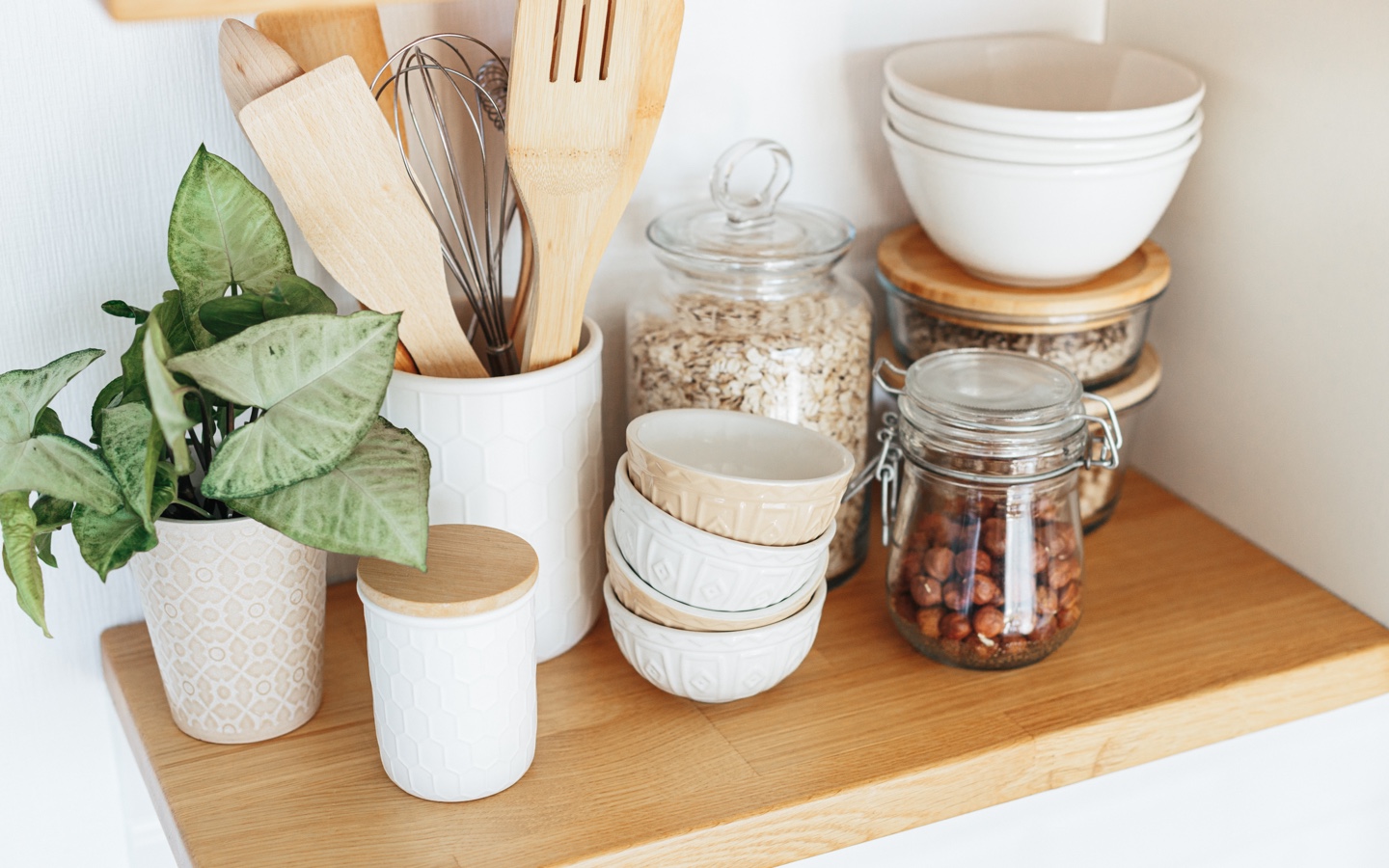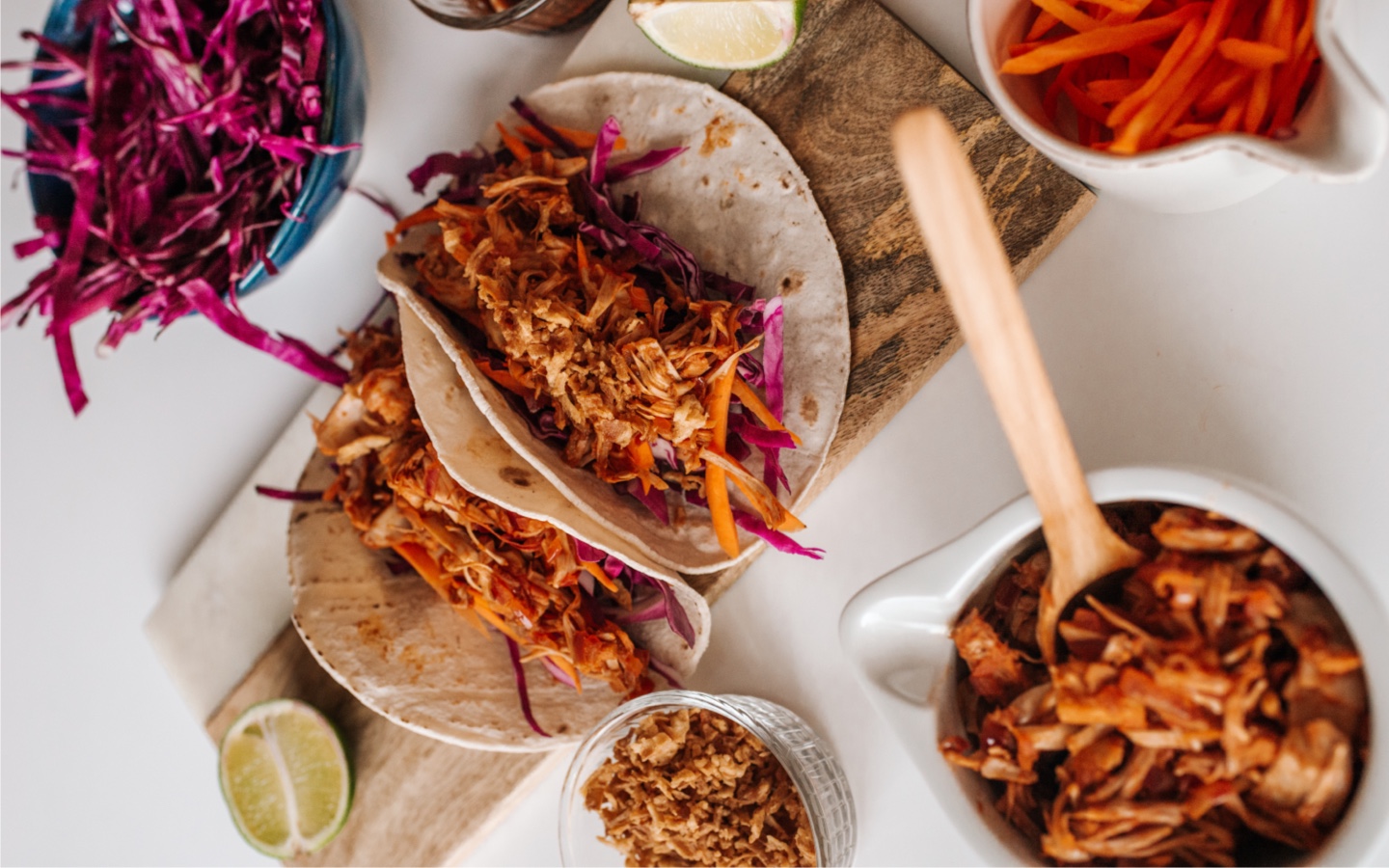Adding plant-based protein, snacks, and meals into your routine is shown to improve overall health. Here’s your plant-based pantry guide.
It’s no secret that consuming less meat is good for your health. A plant-based diet decreases your risk of heart disease, stroke, high blood pressure, and certain cancers, among other ailments. Limiting your intake of red meat, in particular, can help you live longer, according to a Harvard study. Not to mention the significant benefits for the planet. Beef cattle are responsible for habitat and species loss and they cause the largest amount of planet-warming greenhouse gasses within the agriculture sector, which is responsible for 10 percent of all American emissions. So eating less beef helps fight climate change, too.
Of course, you don’t have to bid farewell to meat entirely. It’s a great source of protein, and red meat is rich in iron. But passing on meat, even a few times a week, can improve your health and the planet’s. One study found that skipping just half a serving of meat each day in favor of a plant-based protein can decrease a person’s risk of developing type 2 diabetes.
Making the switch to a plant-forward diet doesn’t have to be complicated, either. Stocking up on a few shelf-stable essentials is an easy way to ensure you always have ingredients available to whip up a well-balanced, satiating meal.
To give you a few ideas, we spoke with Jessica Steinbach, a dietitian who specializes in vegan and sports nutrition. She divulged her favorite plant-based staples and provided guidance on how to continue getting all the right nutrients without animal protein. Here are her favorites.

Read more: Easy Ways to Eat Less Meat
1. Legumes
To start, Steinbach suggests always keeping a few carbohydrate options around to serve as a base for your plant-based meals. Legumes such as beans and lentils are a good idea, she says, because both are packed with protein and fiber. They also allow you to play around with flavors — you can swap out different beans each week or opt to purchase pre-prepared packets of flavored lentils. The options truly are plentiful, and they’re typically budget-friendly to boot. All you need is one or two varieties in your pantry, then you can mix and match with other ingredients throughout your week to create an array of easy meals.
If you’re curious which legume is the most nutrient-rich, don’t worry too much. The best option is the one that tastes best to you, says Steinbach. That’s because your body is best able to absorb nutrients when it’s relaxed and free of stress — like when you’re indulging in a meal you really love.
2. Jackfruit
This tree fruit is one of the most versatile staples you can add to your pantry. Because it has a meat-like texture, it does a great job of masquerading as an animal protein. Once you marinate it, you may not even be able to tell much of a difference. Some favorite ways to prepare it: a pulled-“pork” sandwich, crispy “carnitas,” vegan stew, or even a classic taco. This fruit can be dressed up as almost anything.
And jackfruit itself contains important vitamins and minerals like folic acid and vitamin C. You can buy this fruit fresh, though we definitely recommend stocking a few cans in your pantry for a simple weeknight meal.
3. Soba Noodles
Another essential ingredient to have at your disposal, these deliciously chewy noodles take on the flavor of whatever spices or sauces you choose, so they’re the perfect base for any dish. And you really can’t go wrong with how you decide to prepare them. There are myriad recipes available online, but you can also wing it and still end up with a tasty meal. It’s as simple as steaming some leftover veggies, adding a plant-based protein, and seasoning with your favorite spices.

Read more: Our 7 Favorite Vegetarian Cookbooks
4. Nutritional Yeast
Known for its subtle cheesy taste, this deactivated yeast is a go-to for enriching the flavor of your dishes. Sub it for parmesan cheese on a plate of pasta, sprinkle it on a couple soft-boiled eggs, or add it to a grain bowl. It can also be used to make a vegan cheese sauce, like this one.
To boost the nutrition, Steinbach suggests looking for brands fortified with B12, a vitamin that supports bone health among other things.
5. Seeds and Nuts
Any time you limit a certain food in your diet, you can create gaps in nutrition. For plant-based eaters in particular, it can be tough to get enough vitamin B12, iodine, Omega-3s, calcium, and vitamin D. That’s why it’s important to keep your pantry stocked with nuts and seeds — like flax seeds and walnuts. Munch on these savory snacks throughout the day or add them to any dish for a little crunch.
Another of Steinbach’s favorites: chia seeds. She loves mixing them with nut milk to create a pudding, topping a bowl with them for a little texture, and adding them to her water.
“They can be used in a variety of ways, and they provide a lot of different nutrients,” she says.
Another good option to have on hand is cashews, which are a main ingredient in many vegan cheese sauces.
6. Vegetable Stock
Having stock on hand is always a good idea. It’s a mainstay for nourishing soups, savory dressings, flavorful sauces, creamy risotto, and so much more. The only caveat: Make sure to peep the sodium content before purchasing. These can be high in salt, but it’s easy to find low-sodium options or, better yet, just make your own from veggie scraps.
7. Tahini
This condiment is ideal for whipping up rich sauces and dressings. Made from sesame seeds, tahini has an earthy flavor and is great for creating everything from decadent hummus to vegan ranch. Add it to noodles with a dash of soy sauce for a creamy dish or even bake a batch of tahini cookies (yup, they’re a thing).

Read more: 4 Immune-Boosting and Meatless Recipes to Try At Home
Have feedback on our story? Email [email protected] to let us know what you think!

Shop Pillows
The Essential Organic Pillow Collection
Gentle, breathable, non-toxic support.





